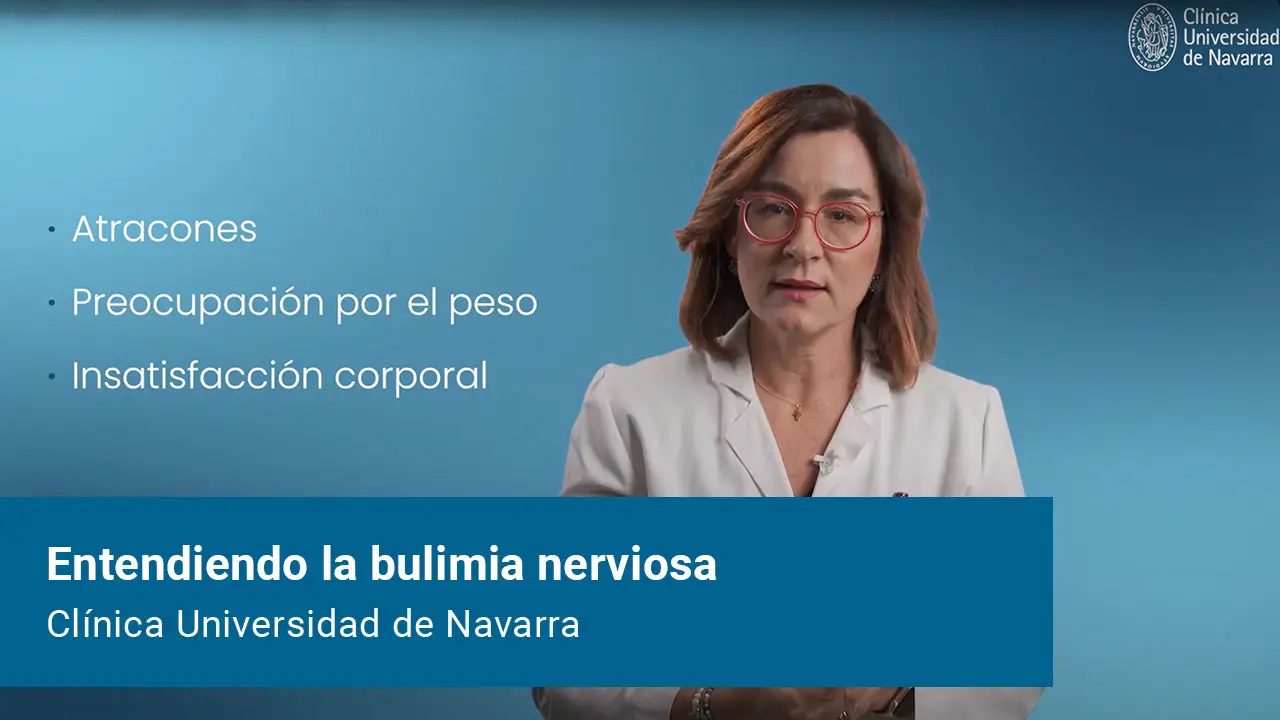Bulimia nervosa
"In general, patients are discharged after several years of treatment, medication is withdrawn, and lifestyle is normalized".
DR. AZUCENA DÍEZ
SPECIALIST. PSYCHIATRY AND CLINICAL PSYCHOLOGY DEPARTMENT

What is bulimia nervosa?
Bulimia nervosa is an eating disorder that is characterized by repeated episodes of excessive food intake in a short period of time. This is coupled with an excessive concern for body weight control, which can lead to the use of methods to control weight gain.
The person with bulimia looks fat, has a distorted idea of his or her own body, yet is of normal weight and has permanent feelings of body dissatisfaction, fear of getting fat, is unable to control his or her impulses with food, and cannot resist the desire to binge.
Two therapeutic approaches are contemplated: the pharmacological and the psychotherapeutic.
Cognitive-behavioral therapy has given very good results. It is very important that parents go to the doctor because patients often deny the symptoms and try to hide the seriousness of the problem.

What are the symptoms of bulimia nervosa?
The symptoms that indicate that a person may have bulimia are binges and excessive food intake in a short period of time.
Loss of control over food, which in turn generates a lot of anxiety.
The patient can use compensatory mechanisms to control weight gain (use of diuretics, laxatives, excessive exercise, hypocaloric diet, fasting periods, etc.).
In addition to the psychological symptoms that may be present (anxiety, depression, low self-esteem...), physical symptoms may occur such as headaches, dental problems, swollen face, hair loss, irregularity in menstruation, dehydration, arrhythmias, etc.
Do you have any of these symptoms?
You may have bulimia nervosa
What are the causes of bulimia?
The cause of this disease is multifactorial and the clinical symptomatology represents the end of the interaction of three types of factors:
- Predisposing factors: individual, family and cultural.
- Precipitating factors: crisis situations, such as affective losses or the beginning of a strict diet due to personal or body dissatisfaction.
- Perpetuating factors: malnutrition clinic and associated affective clinic (anxiety, depression...)
It is believed that there may be a problem in the regulation of serotonin, since the antidepressants serotonin reuptake inhibitors (SSRIs) improve the levels of this neurotransmitter and are useful in the treatment of bulimia.
What other problems arise?
There are a number of medical complications and physical risks from severe malnutrition, such as digestive disorders (from binge eating, vomiting, use of laxatives), heart problems (from malnutrition), biochemical alterations in the blood (low potassium or sodium), endocrine or hormonal changes and lack of calcium in the bone.
Patients with bulimia often have depression, anxiety and addiction problems or impulse control disorders (compulsive shopping, kleptomania - stealing things that are not needed -, self-mutilation and promiscuity).
How is bulimia nervosa diagnosed?

The diagnosis is clinical. Medical causes of loss of control with food and vomiting must be ruled out in bulimia.
- Diagnostic interview.
- Rule out organic disease by means of: magnetic resonance, general and specific analysis and evaluation by other specialists (endocrinologists).
- Psycho diagnostic tests.
- Carrying out the diagnosis following the criteria of the ICD-10 and the DSM-IV-TR.
How is bulimia nervosa treated?
The goals of treatment for bulimia nervosa are:
- The disappearance of binge eating and purgative behaviors.
- The development of standardized eating patterns.
- The modification of dysfunctional attitudes and ideas about weight and body image.
- The disappearance of the associated symptomatology (mainly anxiety and depression).
- The learning of guidelines to create and maintain stable social relationships.
- Prevention of relapses.
A plan for weight regain and dietary and nutritional re-education should be made in a team with different specialists, usually led by a psychiatrist or child psychiatrist.
A very close follow-up is made so that the recovery of the weight is gradual, with frequent controls.
Problems in the diet that affect the patient are studied and improved, as well as factors that influence the binges and vomits (anxiety for the school, problems with the parents or friends).
In addition to the physical improvement of weight, diet and eating habits, a psychiatric treatment is done, which combines psychoeducation, individual psychotherapy, group psychotherapy and family therapy.
It can help with medication such as antidepressants, which improve binge eating, vomiting, depressed mood and treat other associated problems.
The Department of Psychiatry and Medical Psychology of the
of the Clínica Universidad de Navarra
Through a multidisciplinary work, the Department of Psychiatry and Clinical Psychology assists patients in a comprehensive way: it identifies the main causes of the disease and provides an individual approach with the most appropriate and effective treatments.
Thanks to the experience of its team, it is able to offer the most advanced biological therapies, as well as an adequate psychotherapeutic orientation. In this way, the patient is helped to solve both personality problems and alterations in interpersonal and family dynamics.
Organized in specialized units
- Child Psychiatry.
- Adolescent Psychiatry.
- Adult Psychiatry.
- Family therapy.
- Psychiatric hospitalization.
- Clinical psychology.

Why at the Clinica?
- Integral evaluation of the patient.
- Personalized diagnosis.
- Multidisciplinary team.

























